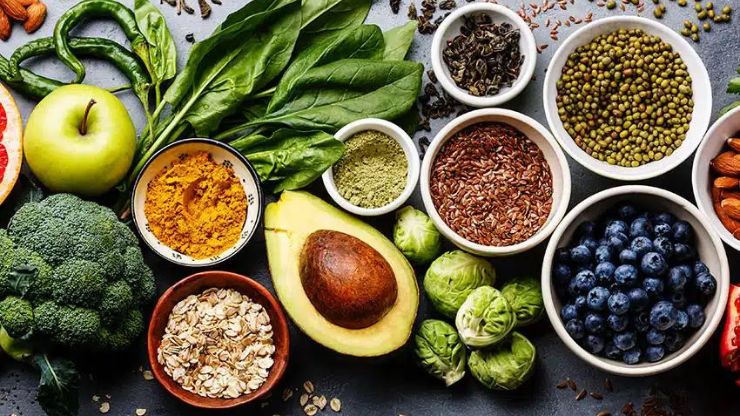Healthy Foods That Boost Energy – Maintaining consistent energy levels is essential for daily productivity, mental alertness, and overall well-being. While many people turn to caffeine or sugary snacks for a quick energy boost, these solutions often result in energy crashes and adverse health effects. Instead, a more sustainable approach to maintaining energy involves choosing the right foods that provide long-lasting vitality.
Healthy foods play a crucial role in ensuring that our bodies receive the necessary nutrients for sustained energy production. In this guide, we will explore the fundamentals of energy-boosting foods, including carbohydrates, proteins, healthy fats, vitamins, and minerals. We will also delve into the significance of hydration, superfoods, and meal planning to help you make informed dietary choices that support your energy levels.
By the end of this guide, you will be equipped with the knowledge to create a balanced, energy-boosting diet that enables you to conquer your daily tasks and live life to the fullest.
Table of Contents
ToggleImportance of maintaining energy levels for daily life
Maintaining energy levels is of paramount importance for daily life due to several key reasons:
- Sustaining Physical Activity: Energy is required to perform even the most basic physical tasks, from getting out of bed in the morning to more strenuous activities like exercise. Maintaining adequate energy levels ensures that you can engage in daily physical activities with ease.
- Enhancing Productivity: Optimal energy levels are essential for productivity at work, school, and in personal pursuits. A well-rested and energized individual can focus, think clearly, and complete tasks efficiently.
- Promoting Mental Alertness: Energy levels are closely linked to mental alertness and cognitive function. Insufficient energy can lead to brain fog, difficulty concentrating, and decreased mental acuity.
- Supporting Emotional Well-Being: Fatigue and low energy levels can contribute to mood swings, irritability, and stress. Maintaining consistent energy levels can help stabilize emotions and improve overall well-being.
- Regulating Metabolism: Energy is the fuel for the body’s metabolic processes. Consistently low energy levels can disrupt metabolism, potentially leading to weight gain or other health issues.
- Healthy Sleep Patterns: Balanced energy levels throughout the day can contribute to better sleep patterns. A well-regulated circadian rhythm ensures better sleep quality and duration, further enhancing overall health.
- Immune System Function: The body’s immune system relies on energy to function properly. Insufficient energy levels can weaken the immune response, making the body more susceptible to illness.
- Preventing Chronic Conditions: Maintaining proper energy levels through a balanced diet and regular exercise can reduce the risk of chronic health conditions, such as obesity, diabetes, and heart disease.
Also, Read – High Protein Breakfasts
Healthy Foods That Boost Energy
Complex carbohydrates
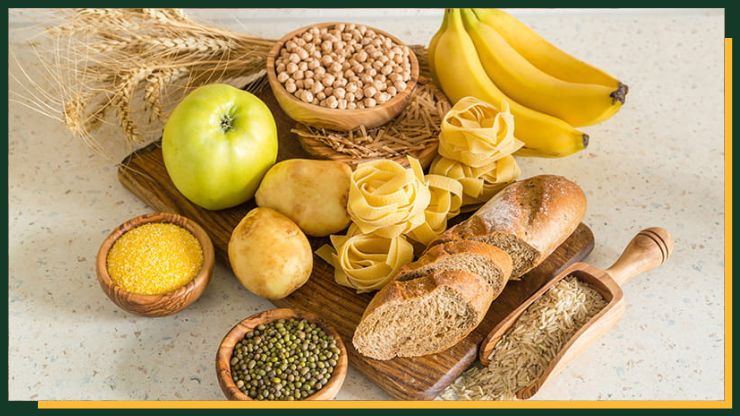
Complex carbohydrates, such as whole grains (brown rice, whole wheat bread), oats, and sweet potatoes, provide a sustained source of energy. They release glucose slowly into the bloodstream, helping to maintain consistent energy levels throughout the day.
These foods are high in fiber, vitamins, and minerals, making them a healthier choice compared to simple carbohydrates like sugary snacks and white bread, which can lead to energy spikes and crashes. Including complex carbohydrates in your diet can help regulate blood sugar and provide the necessary fuel for your body and brain to function optimally.
Leafy greens

Leafy greens, like spinach and kale, are nutritional powerhouses. They’re rich in essential nutrients, including vitamins (A, C, K), minerals (iron, calcium), and antioxidants. Iron in leafy greens aids in oxygen transport, helping prevent fatigue.
Their high fiber content supports digestion and can contribute to sustained energy levels. Antioxidants combat oxidative stress, promoting overall health. Incorporating leafy greens into your diet can enhance your energy, support immune function, and reduce the risk of chronic diseases.
Whether in salads, smoothies, or cooked dishes, these greens are a valuable addition to a well-rounded, energizing diet.
Nuts and seeds
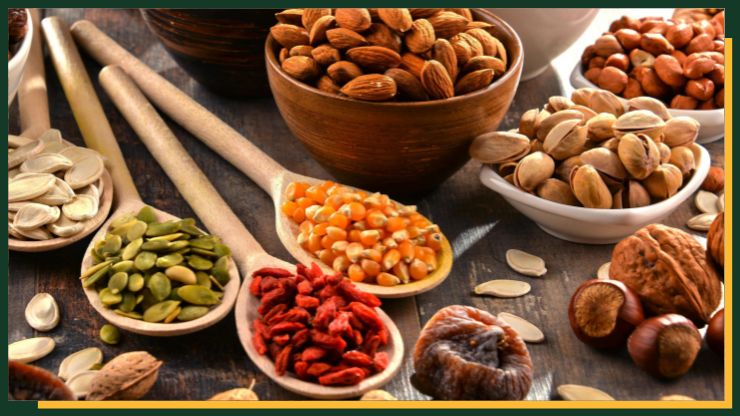
Nuts and seeds, like almonds, walnuts, chia seeds, and flaxseeds, offer a wealth of health benefits. They are dense in healthy fats, protein, and fiber, which provide sustained energy throughout the day. These nutrient-rich foods also contain vitamins, minerals, and antioxidants that support overall well-being.
Healthy fats in nuts and seeds, including omega-3 fatty acids, promote heart health and brain function. The protein and fiber content helps control hunger and maintain steady blood sugar levels, preventing energy crashes. Incorporating a variety of nuts and seeds into your diet can contribute to increased energy, improved satiety, and a reduced risk of chronic diseases.
Also, Read – Delicious Foods that Help Digestion
Fatty fish

Fatty fish, such as salmon, mackerel, and trout, are nutritional superstars due to their high content of omega-3 fatty acids. These essential fats support cognitive function, reduce inflammation, and promote heart health.
Omega-3s in fatty fish are particularly beneficial for mental energy and mood regulation. Additionally, they contain high-quality protein and essential nutrients like vitamin D and selenium, further boosting overall health.
Regular consumption of fatty fish can enhance brain function, reduce the risk of chronic diseases, and provide a sustained source of energy. Including them in your diet supports both physical and mental well-being, making them a valuable addition to a healthy eating plan.
Lean proteins

Lean proteins, such as chicken, turkey, lean beef, and tofu, are essential for a balanced diet. They provide a high-quality source of amino acids necessary for muscle repair, immune function, and overall energy production.
These proteins are low in saturated fats, making them heart-healthy options. Consuming lean protein helps control hunger and stabilize blood sugar levels, preventing energy fluctuations and promoting a feeling of fullness.
Additionally, they’re rich in essential nutrients like B vitamins, iron, and zinc, which are crucial for energy metabolism and overall vitality. Incorporating lean proteins into your meals supports muscle health, enhances energy levels, and aids in maintaining a healthy body composition.
Eggs

Eggs are a versatile and nutrient-dense food that can boost your energy and overall health. They are a fantastic source of complete protein, providing all the essential amino acids your body needs for muscle repair and growth. Eggs are also rich in B vitamins, including B12, riboflavin, and folate, which play a crucial role in converting food into energy.
Additionally, eggs contain essential nutrients like choline, which is important for brain function and can contribute to mental alertness and energy. Eating eggs can help you feel fuller for longer, reducing the likelihood of energy crashes between meals. Whether boiled, scrambled, or poached, eggs are a convenient and nutritious addition to your diet.
Berries
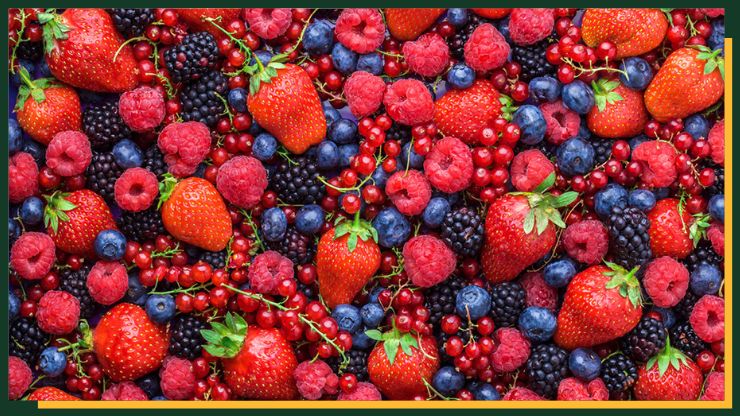
Berries, such as blueberries, strawberries, and blackberries, are not only delicious but also packed with health benefits. They are rich in antioxidants, particularly anthocyanins, which help combat oxidative stress and inflammation in the body. The high fiber content in berries aids in regulating blood sugar levels, preventing energy spikes and crashes.
Berries also contain essential vitamins and minerals, like vitamin C and manganese, which support overall well-being. Their natural sweetness can satisfy sugar cravings without causing a blood sugar rollercoaster.
Including berries in your diet can enhance energy levels, improve cognitive function, and contribute to heart health. Whether eaten fresh, in smoothies, or as toppings for yogurt and oatmeal, berries are a tasty way to boost your energy and promote good health.
Bananas
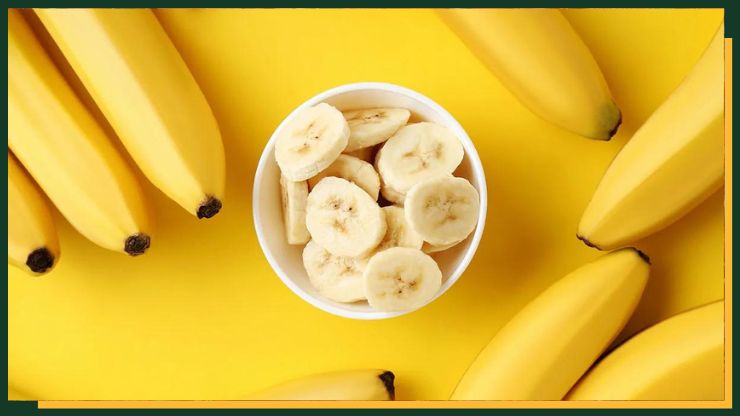
Bananas are a convenient and nutritious energy-boosting fruit. They are a great source of natural carbohydrates, primarily in the form of easily digestible sugars, such as glucose, fructose, and sucrose. This makes them a quick and effective source of energy, making them an ideal choice for a pre-workout snack or a midday pick-me-up.
Bananas are also rich in potassium, a mineral that plays a key role in maintaining proper muscle and nerve function. Potassium helps prevent muscle cramps and aids in the efficient utilization of energy. Additionally, they provide essential vitamins, such as vitamin C and vitamin B6, which support overall vitality. Incorporating bananas into your diet can provide a natural, sustained energy boost while offering numerous health benefits.
Greek yogurt

Greek yogurt is a protein-packed dairy product that can enhance your energy and overall well-being. It is an excellent source of high-quality protein, which helps in muscle repair, aids in satiety, and contributes to steady energy levels throughout the day. Greek yogurt also contains probiotics, beneficial bacteria that support digestive health and nutrient absorption, indirectly influencing your energy.
Furthermore, it provides essential nutrients like calcium and vitamin B12, which are important for bone health and energy metabolism. The combination of protein, probiotics, and essential nutrients makes Greek yogurt a nutritious and satisfying snack or breakfast option, helping you maintain energy, support your immune system, and promote optimal gut function.
Water

Water is essential for maintaining energy and overall health. Staying hydrated is crucial as it directly impacts your body’s ability to function optimally. Dehydration can lead to fatigue, decreased mental alertness, and reduced physical performance.
Water is essential for various bodily processes, including nutrient transport, temperature regulation, and waste removal. It helps maintain blood volume, ensuring oxygen and nutrients reach your cells efficiently, thus preventing energy dips.
Don't just scroll, subscribe!
BuzzTrail's unique web-stories are the cure for boredom you've been waiting for.
The recommended daily water intake varies, but a general guideline is about 8-10 cups (64-80 ounces) for most adults. However, individual needs differ based on factors like activity level, climate, and personal health. Staying adequately hydrated is a simple yet effective way to sustain energy levels and support overall well-being.
Green tea

Green tea is a popular and healthful beverage known for its potential to boost energy and well-being. It contains caffeine, a natural stimulant, which can provide a mild, sustained energy lift without the jitters often associated with higher-caffeine beverages. The combination of caffeine and L-theanine, an amino acid in green tea, enhances mental alertness and focus, contributing to a sense of vitality.
Green tea is rich in antioxidants, particularly catechins, which offer various health benefits. These antioxidants combat oxidative stress and support overall health. Drinking green tea may also aid in weight management and promote heart health.
By incorporating green tea into your daily routine, you can enjoy the benefits of increased energy, improved cognitive function, and enhanced physical well-being.
Legumes
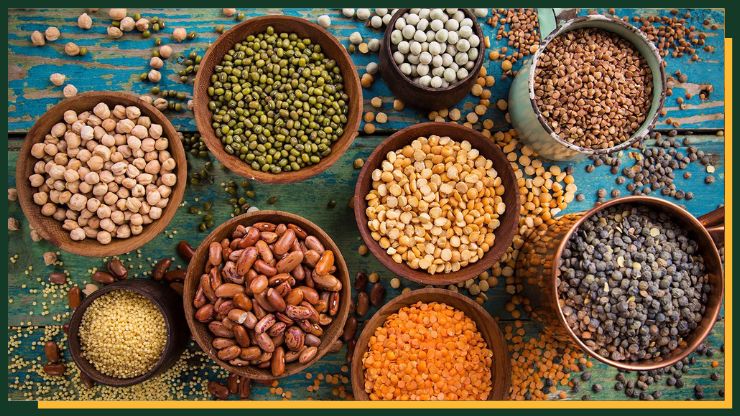
Legumes, including lentils, chickpeas, and black beans, are nutrient-dense foods that can provide sustainable energy and support overall health. They are rich in complex carbohydrates, fiber, and plant-based protein, which help maintain steady blood sugar levels and prevent energy fluctuations. The fiber in legumes also supports digestion and promotes a feeling of fullness.
Additionally, legumes are excellent sources of vitamins and minerals like folate, iron, and potassium, which play a crucial role in energy metabolism, red blood cell production, and muscle function. Their nutrient profile makes them an essential part of a balanced diet that can help you stay energized, manage your weight, and reduce the risk of chronic diseases. Incorporating legumes into your meals offers a nutritious and filling way to boost your energy levels.
Healthy Eating Tips for Seniors
Focus on Nutrient-Rich Foods
Seniors should prioritize nutrient-rich foods for their health. Opt for a variety of fruits, vegetables, whole grains, lean proteins, and dairy or dairy alternatives. These foods are packed with essential vitamins, minerals, and fiber, promoting overall well-being. Fruits and vegetables offer antioxidants and fiber, while whole grains provide sustained energy and digestive health.
Lean proteins like poultry and fish support muscle maintenance. Additionally, dairy products or alternatives like almond milk provide essential calcium for bone health. A balanced diet rich in these nutrient-dense foods helps seniors maintain their vitality, reduce the risk of chronic diseases, and enjoy a higher quality of life in their golden years.
Portion Control
Portion control is vital for seniors to manage their calorie intake effectively. Aging often leads to a decreased metabolism, so it’s essential to be mindful of portion sizes. Using smaller plates or bowls can help control portion sizes and prevent overeating.
This strategy visually signals a full plate while reducing the risk of excess calorie consumption. Remember that smaller, more frequent meals may be easier for seniors to manage, providing sustained energy throughout the day.
By practicing portion control, seniors can maintain a healthy weight, manage their nutritional needs, and reduce the risk of overconsumption-related health issues like obesity and heart disease.
Prioritize Fiber
Fiber is a dietary cornerstone for seniors’ health. Prioritizing fiber-rich foods helps maintain digestive health, manage weight, and reduce the risk of chronic diseases. Seniors should focus on consuming whole grains like oats, brown rice, and whole wheat bread, as well as a variety of fruits, vegetables, and legumes like beans and lentils.
Fiber aids digestion, preventing constipation, and promoting regular bowel movements. It also provides a feeling of fullness, reducing the likelihood of overeating.
Moreover, a high-fiber diet can help lower cholesterol levels, control blood sugar, and decrease the risk of heart disease and type 2 diabetes. Seniors should aim to include fiber in their daily meals to support overall well-being.
Include Protein
Protein is a crucial component of a senior’s diet, as it helps maintain muscle mass, supports immune function, and aids in overall health. Seniors should include lean protein sources in their meals, such as poultry, fish, lean cuts of meat, beans, tofu, and low-fat dairy products.
Adequate protein intake becomes even more important as muscle mass naturally decreases with age. Protein-rich foods provide essential amino acids necessary for cell repair and overall bodily functions. They also promote a sense of fullness, aiding in weight management.
Additionally, protein can help seniors recover from illness or injury and support a healthy immune system. Aiming for about 15-20% of daily calories from protein is a wise dietary choice for seniors.
Watch Sodium Intake
Monitoring sodium intake is vital for seniors to maintain good health. High sodium levels can lead to elevated blood pressure, increasing the risk of heart disease and other health problems. Seniors should limit their consumption of processed and packaged foods, as these often contain hidden sodium.
Additionally, reducing the use of table salt and opting for herbs, spices, and other flavor-enhancing seasonings can help control sodium intake. Be mindful when dining out, as restaurant meals tend to be high in salt.
A low-sodium diet can promote better heart health, reduce the risk of stroke, and improve overall well-being for seniors. Consulting with a healthcare provider or dietitian for specific sodium recommendations may be beneficial.
Incorporate Healthy Fats
Incorporating healthy fats into a senior’s diet is essential for overall well-being. These fats, such as those found in avocados, nuts, seeds, and olive oil, offer numerous health benefits. They can support brain health, reduce the risk of heart disease, and help with nutrient absorption.
Omega-3 fatty acids, commonly found in fatty fish like salmon and flaxseeds, have anti-inflammatory properties and contribute to cognitive function. Replacing saturated and trans fats, often found in fried and processed foods, with healthy fats can lower the risk of cardiovascular issues.
Seniors should aim to include these fats in their diet while being mindful of portion sizes to maintain a balanced and heart-healthy approach to nutrition.
Be Mindful of Special Dietary Needs
Seniors should be particularly mindful of special dietary needs, especially if they have specific health conditions or dietary restrictions. Common issues like diabetes, heart disease, food allergies, or digestive problems may require tailored eating plans.
Consulting with a healthcare provider or a registered dietitian can provide valuable guidance in creating a personalized diet that addresses these needs. For example, those with diabetes should manage carbohydrate intake, while heart disease patients should focus on reducing saturated fats and sodium.
Food allergies necessitate strict avoidance of allergens. Additionally, considering age-related changes in metabolism, nutrient absorption, and appetite can help seniors make informed choices about their nutrition, promoting optimal health and quality of life.
Stay Hydrated
Seniors should prioritize staying hydrated. As aging can diminish the sensation of thirst, it’s essential to consciously consume adequate water. Aim for at least 8 cups (64 ounces) daily to prevent dehydration, which can lead to various health issues. Signs of dehydration include dry mouth, dark urine, and dizziness.
Sip water throughout the day and consider incorporating water-rich foods like fruits and vegetables into your diet. Monitoring hydration is crucial for overall well-being, as it supports bodily functions, helps maintain cognitive function, and prevents issues like urinary tract infections and constipation.
Conclusion
In conclusion, maintaining consistent energy levels is the cornerstone of a vibrant, productive, and healthy life. By making informed dietary choices, staying physically active, and managing stress effectively, you can ensure that your body and mind have the energy they need to tackle daily challenges and enjoy life to the fullest. Don’t underestimate the transformative power of sustained energy – it’s the key to unlocking your full potential and enhancing your overall well-being.
FAQs
Why is it important to choose the right foods for energy?
Why is it important to choose the right foods for energy?
Selecting the right foods for energy is crucial as it affects physical and mental performance, overall health, and the ability to sustain energy levels without experiencing crashes or fatigue.
What are some good sources of complex carbohydrates for energy?
What are some good sources of complex carbohydrates for energy?
Whole grains like oats and quinoa, fruits, and vegetables are excellent sources of complex carbohydrates that release energy slowly and steadily.
How does protein contribute to energy levels?
How does protein contribute to energy levels?
Protein plays a vital role in muscle repair and maintenance, which is essential for sustained energy. Lean protein sources like poultry, fish, and plant-based options like beans and tofu are beneficial.

